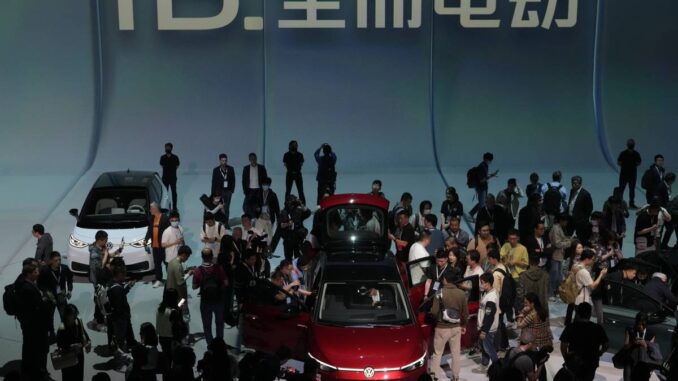
BEIJING — China on Wednesday said it did not “agree with or accept” hefty new EU tariffs on Chinese-made electric cars after an anti-subsidy probe concluded Beijing’s support undercut European automakers.
“China does not agree with or accept the ruling and has filed a complaint under the WTO (World Trade Organization) dispute settlement mechanism,” a spokesman for Beijing’s commerce ministry said, adding: “China will… take all necessary measures to firmly protect the legitimate rights and interests of Chinese companies.”
REJECTION Attendees look at the Volkswagen ID.7 Vizzion, a new electric car during the eve of the Auto Shanghai 2023 show in Shanghai, China, on April 17, 2023. The European Union on Oct. 29, 2024 imposed additional tariffs on Chinese-made electric vehicles, something Beijing refused to accept in reaction to this move. AP PHOTO
The EU on Tuesday decided to impose extra tariffs on Chinese-made electric cars after an anti-subsidy probe concluded Beijing’s state subsidies were unfairly undercutting European automakers.
Once they come into effect, the tariffs will be definitive and last for five years.
The extra duties also apply, at various rates, to vehicles made in China by foreign groups such as Tesla which faces a tariff of 7.8 percent.
Chinese car giant Geely one of the country’s largest sellers of electric vehicles (EVs) faces an extra duty of 18.8 percent, while SAIC will be hit with the highest at 35.3 percent.
The duties will come on top of the current 10 percent on imports of EVs from China.
“China has repeatedly emphasized that the EU’s anti-subsidy investigation into Chinese electric vehicles has numerous unreasonable and noncompliant aspects, representing protectionist practices,” the spokesman added.
“We hope the EU will adopt a constructive attitude, working with China… to quickly reach a solution acceptable to both sides and avoid an escalation of trade frictions.”
Beijing has also launched probes into EU subsidies of some dairy and pork products imported into China.
Trade tensions between China and the EU are not limited to electric cars, with Brussels also investigating Chinese subsidies for solar panels and wind turbines.
The EU is not alone in levying heavy tariffs on Chinese electric cars.
Canada and the United States have in recent months imposed much higher tariffs of 100 percent on Chinese electric car imports.


Be the first to comment